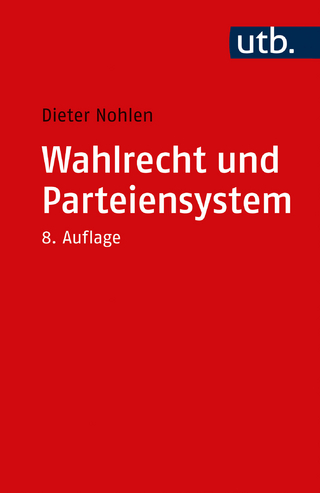
Achieving Justice
Brill (Verlag)
978-90-04-12990-0 (ISBN)
This book gives a systematic and extensive comparative analysis of public beliefs about social justice. Contrary to previous studies it attempts to link public opinion to the philosophical debate on distributive justice, but more importantly it connects the different opinion surveys with the current economic and political situation in the various countries.
What can explain the cross-national variations, and if opinions do change over time, why is this so? Are people’s beliefs influenced by existing welfare practices in the country? Do different policy regimes trigger different pattern of belief among the members of society?
This book should be of interest to researchers and students both in the field of Comparative Opinion Studies, but also those interested in the relationship between public opinion and the political elite.
Toril Aalberg, Dr. Polit (2001) in Political Science, NTNU Trondheim, is a Post.Doc Fellow at the Norwegian University of Science and Technology. She has published several articles about public opinion. She is co-editor of Challenges to Representative Democracy: Parties, Voters and Public Opinion (Fagbokforlaget, 1999).
List of tables
List of figures
1. Public opinion, government policies and distributive justice.
An introduction
1.1The importance of public opinion
1.2What sort of opinion: ideals, perceptions and policy attitudes
1.3What can explain cross-national variations?
1.4What can explain variations across time?
1.5What can explain individual variations?
1.6Methods and data
1.6.1International Social Survey Program (ISSP)
1.6.2The European Value Surveys/ The World Value Surveys (WVS)
1.6.3International Social Justice Project (ISJP)
1.6.4Distributive Justice Perception Project (DJPP)
1.6.5Experiments on Distributive Justice Norms Across Cultures
1.6.6The Luxembourg Income Study (LIS)
1.6.7ILO data on occupational wages and hours of work
1.7Plan of the study
2. Principles of distributive justice: A theoretical approach
2.1What is distributive justice?
2.2The formal and material principles of justice
2.3Principles of equity
2.4Principles of utility
2.5Rawls’ difference principle
2.6Principles of need
2.7 Principles of equality
2.8Summary
3. Public support for distributive principles
3.1Operationalizing the principles of distributive justice
3.2Public support for distributive principles
3.3The magnitude of support for need and equality: the ranking of countries
3.4Structural differences in public support for the various principles
3.4.1Individual level differences in public support for the various principles
3.5Summary
4. Opposing principles and trade-offs: Results from an experimental study
4.1Previous experimental research
4.2The design of the experiment
4.3Theoretical predictions: How would the principles interact?
4.4Support for the individual principles
4.5Trade-offs and interactions
4.6Summary
5. Perceived distributions: The public understanding of reality
5.1Conceptualizing and measuring public perceptions
5.2The causes and consequences of perception
5.2.1The relationship between socio-economic background and perceptions
5.2.2The relationship between values and perceptions
5.3The data: Measuring perceptions and finding the facts
5.4Analysing perceptions of inequality
5.4.1Perception of the proportion of poor
5.4.2Perception of occupational earnings
5.4.3Does what you see depend on where you stand?
5.5Summary
6. Support for egalitarian ideals and policies: Reaction or adjustment?
6.1Egalitarian values and policies - a conceptual clarification
6.2The cultural and historical origin of value preferences
6.3The shift in support for egalitarian values and policies
6.4Data
6.5Public preferences for equality - a comparative perspective
6.6Summary
7. Wages and earning inequalities
7.1Why some occupations deserve higher earnings then others
7.2What influences the acceptance of large earning inequalities?
7.3The data: measuring perceived and ideal occupational earnings
7.4Occupational earnings differences across countries
7.5Are the public divided in their view of the fairness of occupational earnings?
7.6 Explaining the dynamic of change over time
7.7Ideals, perceptions and self interest: the impact of social background.
7.8Summary
8. Taxes and redistribution of income
8.1Welfare regimes and tax policies
8.2Tax loads, progressive taxation and income distribution
8.3Tax policies and public opinion
8.4Public perception of tax-load and support for redistributive policies
8.5Explaining public perception and support for redistribution
8.6Summary
9. Conclusion
9.1The public, the political elite and the philosophers
9.2The structure of public beliefs: ideals, perceptions and policy attitudes
9.3Cross-national variations, the effect of regimes and social structure
9.4When public opinion change over time
9.5The public of different countries and the argument of self interest
9.6Future research
References
Appendix 1
Appendix 2
Appendix 3
Appendix 4
| Erscheint lt. Verlag | 24.3.2003 |
|---|---|
| Reihe/Serie | International Comparative Social Studies ; 7 |
| Verlagsort | Leiden |
| Sprache | englisch |
| Maße | 155 x 235 mm |
| Gewicht | 575 g |
| Themenwelt | Sozialwissenschaften ► Politik / Verwaltung ► Politische Systeme |
| Sozialwissenschaften ► Politik / Verwaltung ► Politische Theorie | |
| ISBN-10 | 90-04-12990-1 / 9004129901 |
| ISBN-13 | 978-90-04-12990-0 / 9789004129900 |
| Zustand | Neuware |
| Haben Sie eine Frage zum Produkt? |
aus dem Bereich


